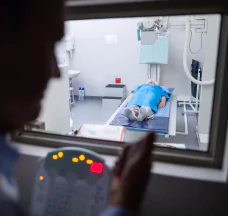Interventional Oncology
Interventional Oncologists play a critical role as part of the cancer team in the diagnosis and treatment of cancer and cancer-related problems using targeted minimally invasive procedures performed under image guidance. They collaborate actively with the medical, surgical and radiation oncology in tumour board discussion to develop a personalised treatment plan for patients. Interventional radiology is a super-speciality branch of radiodiagnosis which encompasses various diagnostic and therapeutic options. Interventional Radiology refers to a range of techniques which rely on the use of radiological image guidance to precisely target therapy. Interventional oncology is a subspecialty field of interventional radiology that deals with the diagnosis and treatment of cancer and cancer-related problems using targeted minimally invasive procedures performed under image guidance.
The specialist uses CT image-guidance to perform minimally invasive techniques for specific cancer and organs such as liver, lungs, etc and for patients with cancers that cannot be surgically removed or effectively treated with systemic chemotherapy. These procedures are also frequently used in combination as a part of curative or palliative therapy resulting in prolonged survival and improved quality of life for patients. At Cytecare, our Interventional Oncologists are well recognised in their field and have the most experience in the region in performing catheter-based procedures for cancer. Most procedures are either outpatient or require an overnight stay in the hospital with minimal recovery time.
It is important to recognise that interventional treatment is usually one of several treatment options available and each case is considered on its own merits. Well recognised advantages of these minimally invasive techniques include reduced risks, shorter hospital stays, lower costs, greater comfort, quicker convalescence and return to work.
Services
These Image guided techniques are used for both diagnosing and treating cancers affecting the Liver, Hepatobiliary system, kidneys, lungs, prostrate and other internal organ cancers.
Diagnostic Procedures
- Ultrasound and CT-guided aspiration (FNA) and drainages
- Ultrasound, CT and fluoroscopic guided biopsies
- Chemoembolization (TACE)
- Chemoembolization (DEB)
- Radioembolization (TARE)
- Image guided Tumor ablation
- Cryoablation
- Radiofrequency ablation (RFA)
- Microwave ablation
Therapeutic Procedures
- Venous Access system (chemotherapy)
- Intraarterial Procedures
- Hepatic vein wedge pressure assessment (diagnose portal hypertension)
Palliative Procedures
- Pain Management – Image Guided Celiac Plexus block
- Placing of stents ( percutaneous transhepatic biliary drainage)
- Percutaneous nephrostomy
- Placement of feeding tubes
- Stenting of malignant structures: bile duct, oesophageal, tracheobronchial and intestinal










